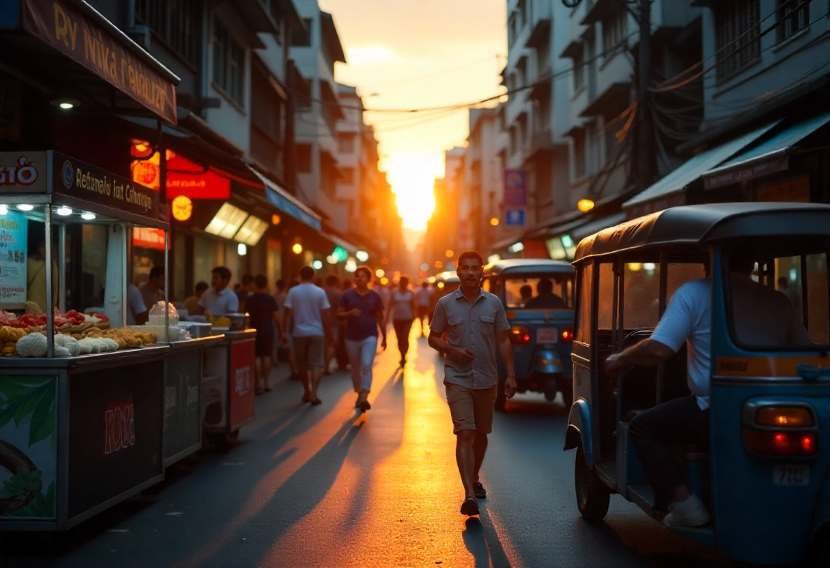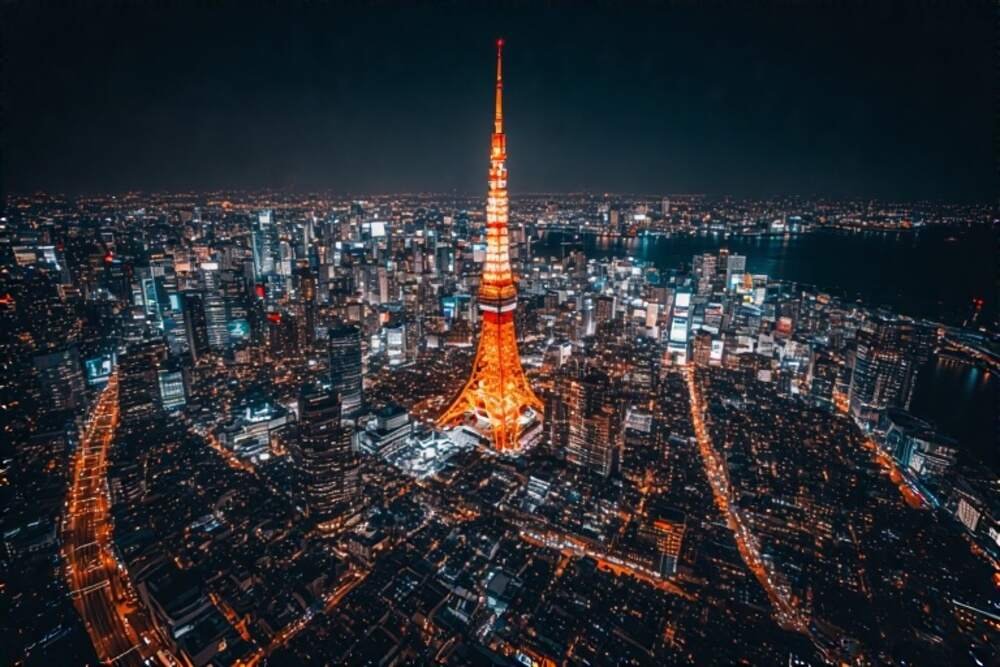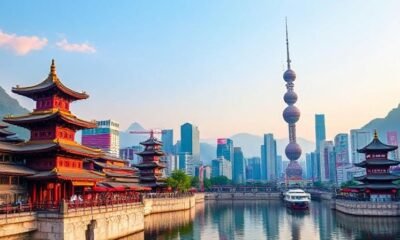Asia Travel Pulse
Thailand Focuses on Luxury Tourism to Maximize Growth Amid Regional Challenges

Tuesday, August 5, 2025
Thailand has reached an unprecedented milestone, outpacing its tourism peak of 40 million visitors. But the country now faces the challenge of adapting to the evolving global tourism landscape. The growing number of affluent travelers from the Asia-Pacific region, particularly from countries like China and India, presents a unique opportunity for Thailand’s luxury tourism sector to thrive. However, experts argue that the country must implement a comprehensive strategy to capitalize on this rising demand and maintain competitiveness with other regional tourism giants.
In a bid to tap into this lucrative market, Thailand is being urged to embrace targeted luxury marketing strategies, alongside new public-private partnerships. This approach is essential to attract high-spending tourists, particularly those in the upper-middle and affluent classes across the Asia-Pacific region, who are increasingly opting for regional travel experiences. Despite these opportunities, Thailand’s tourism sector faces challenges, including the delay of key legislation that could enhance the country’s appeal as a luxury destination.
The delay in passing the entertainment complex bill has been highlighted as a major obstacle, as it prevents Thailand from keeping pace with other emerging destinations in the region. Countries such as Singapore, the UAE, and Vietnam have already made significant investments in integrated resorts and luxury tourism, creating world-class experiences for affluent travelers. Meanwhile, Thailand is at risk of falling behind, missing out on the chance to leverage its tourism strengths such as hospitality, wellness, and cultural offerings.
Luxury Tourism in the Asia-Pacific Region: A Growing Market
The Asia-Pacific region, which generated over 648 million tourism trips last year, is expected to continue its growth trajectory, with projections indicating nearly 700 million trips this year and over 800 million by 2027. The region’s expanding middle class, particularly in India and China, is fueling demand for luxury travel experiences both within Asia and internationally.
China alone boasts over 6.2 million affluent individuals, along with 168 million people in the upper-middle class, making it a key driver of luxury tourism. As these travelers increasingly seek high-end tourism experiences, Thailand, with its rich cultural heritage, luxurious resorts, and warm hospitality, is well-positioned to capture a share of this market. However, despite Bangkok’s status as one of the most visited cities globally, the country faces hurdles, including a decline in Chinese tourist arrivals due to perceived safety issues, such as border scams and regional tensions.
The Road Ahead: Integrating Resorts and Addressing Safety Concerns
In the short term, Thailand must focus on addressing these safety concerns, which are a top priority for high-net-worth individuals. The government is encouraged to enhance tourism promotion efforts, utilizing global celebrities and influencers to change negative perceptions. Additionally, cracking down on illegal activities, such as scams targeting tourists, is crucial to ensuring a secure environment for visitors.
Moreover, the tourism sector would benefit from the enhancement of Thailand’s official tourism websites, making them more user-friendly and appealing to international audiences. Drawing inspiration from successful national tourism websites such as that of Japan, Thailand could significantly improve how information is accessed by prospective travelers.
The focus on integrated resorts is another key area of development for the country. Integrated resorts, which combine luxury hotels, entertainment venues, wellness centers, and gaming facilities, are crucial to attracting affluent tourists seeking diverse and high-quality experiences. Thailand has the opportunity to leverage its strengths and build on successful models from other destinations, including the latest projects in Macau and Singapore. However, the delay in passing the entertainment complex bill is limiting the country’s ability to create these integrated resorts, leaving it vulnerable to competition from other destinations that have already made substantial investments in their tourism infrastructure.
Looking to the Future: A Strategic Shift for Thailand’s Luxury Tourism
To compete effectively with the likes of Singapore, the UAE, and emerging destinations such as Vietnam, Thailand must accelerate its efforts in the luxury tourism sector. This includes developing new infrastructure, expanding public-private partnerships, and creating unique, world-class experiences for travelers. Integrated resorts, similar to those being developed in Singapore’s Sentosa and Marina Bay Sands, as well as in Vietnam, could play a pivotal role in boosting the country’s appeal.
As Thailand looks to strengthen its position as a premier destination for luxury tourism, the role of private investors, such as Galaxy Entertainment Group, is critical. These companies can complement the country’s existing tourism strengths and help build attractions that appeal to the growing demand for high-end travel experiences in the region.
Despite the challenges, Thailand remains optimistic about its potential in the luxury tourism market. With the right strategic investments and a focus on safety and unique offerings, the country can continue to attract affluent travelers and maintain its competitive edge in the Asia-Pacific tourism industry.
Asia Travel Pulse
South Korea Joins Japan, Singapore, Thailand, Kazakhstan, And More In Asia As UK Issues New Travel Warning Over Heightened Risks

Wednesday, August 6, 2025
South Korea Joins Japan, Singapore, Thailand, Kazakhstan, and More as UK Issues New Travel Advisory due to escalating security risks, health concerns, and regional tensions that have raised alarms for British nationals. As the geopolitical landscape continues to shift, the UK Foreign, Commonwealth & Development Office (FCDO) has expanded its travel warnings to include several Asian nations, urging travelers to exercise caution and stay informed. These countries, once considered safe havens, are now experiencing increased instability, prompting the UK to update its travel advice to ensure the safety and well-being of its citizens abroad.
In response to escalating concerns regarding security, health risks, and other regional tensions, the UK Foreign, Commonwealth & Development Office (FCDO) has issued new travel advisories affecting several key destinations in Asia. Countries like South Korea, Japan, Singapore, Thailand, and Kazakhstan are now on the radar as the UK urges citizens to review updated travel guidelines before planning trips.
South Korea: Heightened Tensions and Regional Risks
South Korea, traditionally known for its strong international relations and modern infrastructure, has now become part of the UK’s new travel advisory list. This inclusion comes due to a variety of escalating security and health concerns in the region. With political tensions in neighboring areas, natural disasters, and health risks, South Korea has found itself increasingly involved in situations that require travelers to exercise heightened caution.
Entry Requirements and Passport Validity
For British nationals planning to visit South Korea, entry regulations are clear. Travelers are advised to ensure their passports are valid for at least 6 months from their planned arrival date. If you’re traveling for less than 90 days on a short-term visa, this will be a straightforward process. However, for those intending to stay longer or work in the country, additional documentation and visa applications are required.
Health and Safety Alerts
Health concerns, particularly with communicable diseases, have been highlighted by the FCDO. South Korea, despite its strong healthcare system, is facing challenges in managing public health due to regional outbreaks and ongoing threats. Travelers are encouraged to stay updated on local advisories related to health and disease prevention, especially if coming from countries with known health risks.
Japan: Rising Security Concerns and Regional Instability
Japan has long been considered a safe and reliable destination for travelers, but recent geopolitical developments have prompted the UK to issue an updated travel advisory. While Japan remains one of the safest countries in Asia, ongoing regional tensions have raised concerns about the safety of British nationals in the region.
Entry Requirements and Travel Insurance
To visit Japan, British nationals must ensure their passports are valid for at least 6 months upon arrival. The Japanese immigration authorities are strict about entry requirements, and failure to meet these standards could result in denied entry. Travelers should also ensure they have appropriate travel insurance, especially if engaging in high-risk activities such as hiking or exploring remote areas.
Safety and Security Risks
While Japan itself is not facing direct conflict, the heightened security risk comes from ongoing tensions with neighboring countries. The UK government has advised British nationals to stay informed of the political landscape and remain vigilant, especially in areas with frequent protests or demonstrations.
Singapore: Zero Tolerance for Drug Offenses and Strict Border Controls
Singapore, known for its strict laws and efficient immigration procedures, has been included in the UK’s travel advisory due to its firm stance on drug-related offenses and the enforcement of stringent entry regulations.
Entry Requirements and Passport Validity
As with other countries in the advisory, British nationals traveling to Singapore must ensure their passport has at least 6 months of validity from their planned arrival date. The Singaporean authorities enforce a zero-tolerance policy for drugs, and travelers caught with even trace amounts of illegal substances face severe consequences, including arrest and prosecution.
Travel Insurance and Risk Awareness
The UK government strongly encourages travelers to invest in comprehensive travel insurance. This insurance should cover emergency medical expenses, trip cancellations, and potential legal issues arising from inadvertent violations of Singapore’s strict drug laws.
Thailand: Political Tensions and Travel Restrictions
Thailand, a popular destination for tourists, especially for its beaches and vibrant city life, is also under scrutiny in the latest UK travel advisory. The country has been facing political instability in recent years, with protests and clashes affecting several areas.
Areas to Avoid: Safety First
The FCDO has advised against all but essential travel to specific provinces in southern Thailand, particularly those near the Thailand-Malaysia border. Areas such as Pattani, Yala, Narathiwat, and parts of Songkhla have been flagged due to ongoing conflicts, with insurgent activity reported along the border with Malaysia.
Additionally, the Thailand-Cambodia border has become a flashpoint, with military clashes in certain regions. British nationals are advised to avoid the area and exercise caution when traveling near the border.
Health and Safety Risks
Health risks, such as the spread of tropical diseases, also feature heavily in the advisory. Travelers should ensure they are vaccinated and take proper precautions against mosquito-borne illnesses like dengue fever and malaria.
Kazakhstan: Rising Concerns Over Drug Smuggling and Illegal Activities
Kazakhstan, a vast country located in Central Asia, has been flagged by the UK government due to the increasing risk of involvement in illegal activities, particularly drug smuggling. The country has seen an uptick in organized crime, and British nationals have occasionally been caught up in illegal drug-related incidents during transit.
Entry Requirements and Passport Validity
For those planning to travel to Kazakhstan, it is crucial to ensure that your passport remains valid for at least 6 months beyond your intended stay. Travelers should also be aware of the potential for bureaucratic hurdles and ensure they meet all entry requirements. Those planning to visit rural or remote areas are advised to take extra precautions, as infrastructure may not be as reliable as in major cities like Almaty or Nur-Sultan.
Drug-Related Issues
The UK government has explicitly warned travelers about the risks of being inadvertently involved in drug-related offenses. Kazakhstan has harsh penalties for drug offenses, including for possession of small amounts, and there have been cases where travelers have been detained during routine airport checks.
Additional Travel Advice: Key Tips for All Destinations
While each country has unique risks associated with it, there are common guidelines travelers should follow when considering trips to any of these nations:
- Travel Insurance: The FCDO stresses the importance of comprehensive travel insurance. Whether it’s covering emergency medical situations or unexpected cancellations, having proper coverage can significantly reduce the risk of financial loss in case of unforeseen events.
- Health and Safety: Stay updated on any local health advisories and take necessary vaccinations, especially when traveling to regions where tropical diseases are a concern.
- Local Laws and Regulations: Always familiarize yourself with local laws and customs, particularly regarding issues like drug use, alcohol consumption, and other legal restrictions that may differ from your home country.
- Security Measures: Always stay informed about local safety conditions, especially in areas prone to political unrest, natural disasters, or security threats.
Traveling abroad can be an enriching experience, but it’s essential to prioritize safety and preparation. With the UK’s latest travel advisories, British nationals are encouraged to carefully consider their travel plans to countries like South Korea, Japan, Singapore, Thailand, and Kazakhstan.
If you follow the tips set by Foreign, Commonwealth & Development Office such as getting proper travel insurance and researching the destination, then you can be sure of a relaxed and safe journey. Always check if you have your travel documents set and proper travel insurance so you will be covered in case of emergencies.
South Korea Joins Japan, Singapore, Thailand, Kazakhstan, and More as UK Issues New Travel Advisory due to growing security concerns, health risks, and escalating regional tensions. The UK Foreign, Commonwealth & Development Office (FCDO) has updated its guidance to help British nationals stay informed and safe while traveling in these areas.
Whether you are planning to go South Korea to explore the country’s modern districts, or even Japan to soak in their vibrant culture, I think so long as you are prepared, you will have an enjoyable trip.
Asia Travel Pulse
Thailand’s Tourism Faces Setback As Chinese Visitors Decline, Recovery Plans In Place For 2026

Wednesday, August 6, 2025
Thailand’s tourism industry is currently facing a significant setback, primarily due to the sharp decline in Chinese visitor numbers. As one of the country’s most vital economic pillars, tourism has been hit hard by a downturn in the Chinese market, which traditionally accounted for a large portion of international arrivals. The drop in Chinese visitors has been compounded by increasing competition from other Asian destinations, further intensifying the challenges. However, the Thai government is actively implementing recovery strategies, aiming to restore the tourism sector by 2026. With several initiatives in place, including delayed travel fees, flight incentives, and digital entry systems, the country is positioning itself for a gradual revival. These efforts are expected to bring about a substantial recovery in visitor numbers and reestablish Thailand as a top global tourism destination in the coming years.
Growth from Other Markets
While Chinese tourism is down, other international markets are seeing growth. Long-haul travelers from countries like India, Japan, the US, and Australia are increasing in number, contributing to higher spending in Thailand. However, these markets represent only 28% of the total arrivals, insufficient to fully compensate for the drop in Chinese visitors.
Government Efforts to Revitalize Tourism
To address the decline, Thailand has introduced several measures aimed at revitalizing the sector:
Postponing the Travel Fee: The Thai government has delayed the implementation of the “Kha Yeap Pan Din” travel fee, initially set for 2025, to mid-2026. The fee, designed to fund tourism infrastructure and insurance for visitors, will be set at 300 THB for air arrivals and 150 THB for land or sea entry.
Tourism Incentives: The government has launched a subsidy program offering 350,000 THB per charter flight to encourage airlines to increase services to Thailand. Additionally, agreements with travel agencies in China are expected to bring 150,000 Chinese tourists to the country.
Digital Entry System: A new digital entry system has been implemented to streamline the visitor registration process, reducing wait times and improving the arrival experience for tourists.
Recovery Outlook by 2026
Despite the current decline, there is optimism for recovery. Experts predict that by 2026, Chinese tourism could recover to 70-80% of pre-pandemic levels, aided by the government’s initiatives. The combination of fee delays, subsidies, and digital infrastructure is expected to support the sector’s rebound.
Conclusion
In conclusion, Thailand’s tourism sector is currently grappling with a sharp decline in Chinese visitors, a market that historically played a crucial role in the country’s tourism industry. This drop has been further exacerbated by growing competition from other Asian destinations, making recovery even more challenging. However, the Thai government is taking proactive measures to address these challenges and revitalize the tourism industry. The delay in the implementation of the “Kha Yeap Pan Din” travel fee, subsidies for charter flights, and the introduction of a more efficient digital entry system are just a few of the strategies being employed. These initiatives are designed to improve the tourist experience, attract more international visitors, and boost the sector’s resilience. Although the short-term outlook remains difficult, there is optimism that by 2026, Thailand’s tourism will recover to at least 70-80% of pre-pandemic levels, particularly with the expected return of Chinese tourists. With these efforts in place, Thailand is on track to overcome the current setbacks and restore its status as one of the world’s leading travel destinations.
Asia Travel Pulse
Luxury Travel Market in Asia Pacific Set for Continued Growth as Connections Luxury Asia Pacific Event Debuts in Tokyo with High-End Networking and Cultural Immersion Opportunities

Wednesday, August 6, 2025
The luxury travel sector across the Asia Pacific is set to keep growing strong, fuelled by rising personal wealth, new travel tastes, and a lively craving for customized, premium journeys. The first Connections Luxury Asia Pacific 2025 event hitting Tokyo is a clear sign of this momentum. It will pull together more than 120 of the finest travel experts for focused networking, private one-on-one talks, and hands-on cultural deep dives. With luxury tourism in the region on track to increase at 8.6% each year until 2030, this first-of-its-kind gathering is a perfect opportunity to build connections, catch the latest sector shifts, and capture the fast-growing high-net-worth tourist market that spans the entire Asia Pacific.
As the luxury travel industry continues its remarkable expansion across Asia Pacific, a pivotal event is poised to take place this October. The Connections Luxury Asia Pacific 2025, set in Tokyo, Japan, from October 5 to 8, is slated to be one of the most anticipated gatherings for the region’s top-tier travel professionals. This exclusive event, organized in partnership with the Tokyo Convention & Visitors Bureau, is set to create unparalleled opportunities for networking, collaboration, and the sharing of insights among the industry’s elite players.
For the first time, the Connections Luxury Asia Pacific event will unite senior decision-makers, luxury travel suppliers, and influential travel agencies from across the globe. With over 120 top-level executives participating, the event promises to be a strategic platform for forging long-term partnerships and discussing the future of luxury tourism in the Asia Pacific region.
A Strategic Convergence for Luxury Travel Professionals
The Connections Luxury Asia Pacific 2025 is more than just a typical trade show. It serves as a high-level forum where the finest travel professionals come together to engage in meaningful, pre-scheduled, one-to-one meetings. These private sessions are designed to foster collaboration between luxury travel suppliers and travel agencies that cater to high-net-worth individuals (HNWIs). With an increasingly affluent clientele in the Asia Pacific, the demand for bespoke, tailored travel experiences is reaching new heights. This event offers the ideal setting to align these needs with the offerings of luxury suppliers from around the world.
At a time when the luxury tourism market is forecast to grow at an 8.6% annual rate through 2030, according to Tourism Economics, the Connections Luxury Asia Pacific event aligns perfectly with the region’s rapid development. As the Asia Pacific luxury market was valued at approximately $270 billion in 2023, the event will focus on expanding the region’s reach and harnessing opportunities from this lucrative sector. The event will showcase the latest trends, from ultra-personalized itineraries to exclusive travel experiences that cater to the desires of the region’s wealthiest travelers.
Prestigious Venues, Cultural Immersion, and Networking Opportunities
Held at some of Tokyo’s most luxurious venues, the Connections Luxury Asia Pacific event will take place at esteemed properties such as the JW Marriott Hotel Tokyo, Fairmont Tokyo, Happo-En, and The Capitol Hotel Tokyu. These venues offer a perfect blend of modern sophistication and traditional Japanese elegance, setting the tone for meaningful business discussions in an exceptional environment. The Hotel Chinzanso Tokyo will also host select buyers, offering them the opportunity to experience the finest hospitality that Tokyo has to offer.
While business meetings are the core of the event, there will also be opportunities for cultural immersion. Japan’s rich heritage, combined with its modernity, will be on full display, as guests participate in curated cultural experiences. These activities will allow international travel professionals to connect with Tokyo’s history, art, and cuisine, further solidifying the region’s importance as a destination for affluent travelers seeking immersive, luxury experiences.
The combination of strategic networking and cultural exposure will provide participants with the knowledge and tools necessary to capitalize on the growing demand for high-end travel experiences in the Asia Pacific region.
Exploring Asia Pacific’s Booming Luxury Tourism Market
The luxury tourism sector in Asia Pacific is experiencing an unprecedented surge in demand. The region, home to some of the wealthiest individuals globally, has become a focal point for high-net-worth travelers seeking customized, exclusive travel experiences. According to a 2023 report by Tourism Economics, Asia Pacific’s luxury travel market is expected to reach new heights over the next decade. The increasing number of ultra-wealthy individuals in countries like China, India, Japan, and South Korea has driven the demand for more tailored, luxurious travel offerings.
As long-haul travel becomes more accessible and affluent travelers seek more personalized and exclusive services, the region’s luxury travel professionals are working hard to meet these growing needs. The Connections Luxury Asia Pacific event offers a platform for these professionals to collaborate and showcase their offerings to a high-caliber audience.
The demand for exclusive services is growing rapidly across various sectors, including private jet charters, yacht rentals, luxury cruises, and luxury hotels. Travelers are no longer content with standard offerings; they seek unique, one-of-a-kind experiences that deliver both luxury and personalization.
One key trend driving this growth is the rising popularity of wellness tourism. As affluent travelers look for ways to rejuvenate both physically and mentally, wellness retreats, eco-friendly resorts, and exclusive spa experiences have surged in demand. The Connections Luxury Asia Pacific event will provide a crucial opportunity for luxury travel suppliers in the wellness and eco-tourism sectors to engage with top-tier travel agencies that can offer these exclusive services to HNWIs across the Asia Pacific.
Registration and Exclusive Access for Buyers
The success of the Connections Luxury Asia Pacific event can be measured by the rapid sell-out of buyer registrations, which closed early due to overwhelming demand. This indicates the strong appetite for access to top luxury brands and exclusive travel experiences. With buyer participation fully booked, the event will still offer limited opportunities for luxury suppliers to engage with top-tier travel agencies and expand their reach in the region.
For the event’s organizers, the sold-out registration speaks volumes about the current demand for luxury travel experiences in Asia. The event has created an invaluable opportunity for suppliers to engage directly with decision-makers who cater to the most discerning clients. These interactions will help suppliers better understand the evolving demands of HNWIs and tailor their offerings accordingly.
Capitalizing on Asia Pacific’s Expanding Market
As global wealth continues to shift towards Asia Pacific, the region’s luxury travel market has become a key growth driver for the global tourism industry. For luxury travel agencies and suppliers, staying ahead of emerging trends and understanding the shifting preferences of affluent travelers is crucial for long-term success. The Connections Luxury Asia Pacific event will equip participants with the insights needed to capitalize on this dynamic market.
Moreover, the event will provide valuable information on the digital transformation of the luxury travel industry. Technology has become an essential component of the luxury tourism experience, with AI-powered personalization tools, seamless booking platforms, and digital concierge services enhancing the way high-net-worth travelers engage with travel brands. Suppliers and agencies will have the chance to discuss how technology is shaping the future of luxury tourism and explore new ways to innovate and stay ahead of the curve.
Key Takeaways from Connections Luxury Asia Pacific 2025
- A gathering of the region’s top luxury travel professionals will take place in Tokyo, offering unparalleled networking opportunities and cultural immersion experiences.
- Over 120 senior decision-makers from luxury travel suppliers and top travel agencies will attend, reflecting the booming demand for high-end tourism experiences.
- Tokyo’s iconic venues, such as JW Marriott Tokyo, Fairmont Tokyo, and The Capitol Hotel Tokyu, will host the event, creating an unforgettable backdrop for meaningful business exchanges.
- The Asia Pacific luxury travel market continues to expand, with projections indicating an annual growth rate of 8.6% through 2030.
- Buyer registrations for the event are already sold out, highlighting the strong demand for networking and collaboration opportunities in the region’s luxury tourism sector.
- Luxury travel professionals will gain valuable insights into the latest trends, including wellness tourism, eco-tourism, and the digitalization of the luxury travel experience.
The launch of Connections Luxury Asia Pacific 2025 in Tokyo signals just how fast the region’s luxury travel scene is expanding, fueled by wealth growth and a hunger for tailor-made journeys. With its mix of elite networking and deep cultural discovery, the event stands out as the ideal meeting point for anyone aiming to seize a slice of this fast-moving segment.
Taking place in a city that itself is a symbol of prestige, the Connections Luxury Asia Pacific 2025 event is a turning point for travel in the continent. Professionals in the luxury segment will, for the first time, meet under one roof to cultivate valuable ties and uncover the next big shifts in high-end tourism. The shift toward highly personalized, experience-first travel is clear, and the agenda’s emphasis on craftsmanship and genuine cultural exchanges means every delegate will walk away with fresh knowledge and key contacts to outpace the competition.
For luxury operators and travel advisors, this is a once-in-a-generation occasion to connect with Asia’s expanding affluent base, foster impactful partnerships, and accelerate growth in one of the planet’s richest travel markets.
-

 Brand Stories2 weeks ago
Brand Stories2 weeks agoBloom Hotels: A Modern Vision of Hospitality Redefining Travel
-

 Brand Stories2 weeks ago
Brand Stories2 weeks agoCheQin.ai sets a new standard for hotel booking with its AI capabilities: empowering travellers to bargain, choose the best, and book with clarity.
-

 Destinations & Things To Do2 weeks ago
Destinations & Things To Do2 weeks agoUntouched Destinations: Stunning Hidden Gems You Must Visit
-

 Destinations & Things To Do2 weeks ago
Destinations & Things To Do2 weeks agoThis Hidden Beach in India Glows at Night-But Only in One Secret Season
-

 AI in Travel2 weeks ago
AI in Travel2 weeks agoAI Travel Revolution: Must-Have Guide to the Best Experience
-

 Brand Stories1 month ago
Brand Stories1 month agoVoice AI Startup ElevenLabs Plans to Add Hubs Around the World
-

 Brand Stories4 weeks ago
Brand Stories4 weeks agoHow Elon Musk’s rogue Grok chatbot became a cautionary AI tale
-

 Brand Stories2 weeks ago
Brand Stories2 weeks agoContactless Hospitality: Why Remote Management Technology Is Key to Seamless Guest Experiences
-

 Asia Travel Pulse1 month ago
Asia Travel Pulse1 month agoLooking For Adventure In Asia? Here Are 7 Epic Destinations You Need To Experience At Least Once – Zee News
-

 AI in Travel1 month ago
AI in Travel1 month ago‘Will AI take my job?’ A trip to a Beijing fortune-telling bar to see what lies ahead | China













You must be logged in to post a comment Login